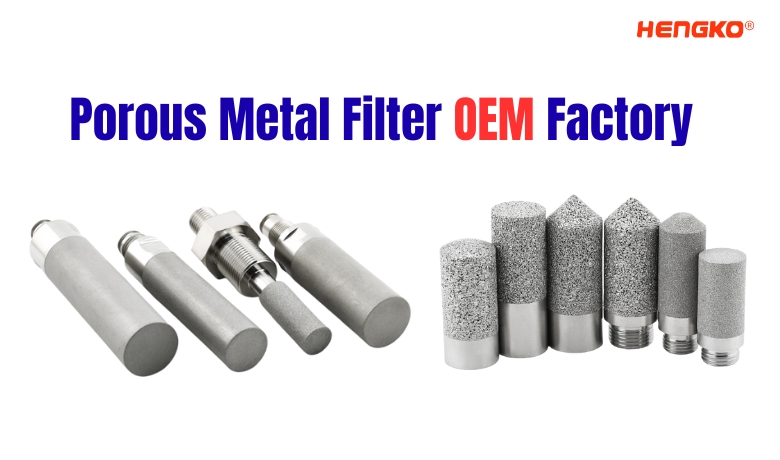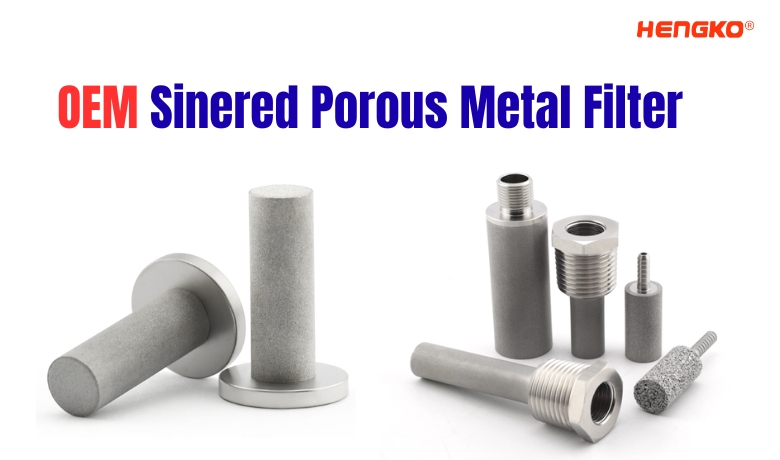-

High Pressure 1/4″ VCR Metal Gasket Porous Filter for Semiconductor Industry
Porous Metal Gasket Filter for Semiconductor Applications A Reliable Solution for Protecting Precision Gas Systems: 1.) Designed specifically for sem...
View Detail -

1/2″ VCR Gasket with Fine Porous Sintered Metal Filter for Semiconductor Industry
Porous Metal Gasket Filter for Semiconductor Applications A Reliable Solution for Protecting Precision Gas Systems: 1.) Designed specifically for sem...
View Detail -

VCR Metal Gasket Porous Filter for Semiconductor Gas Industry High Pressure Pipeline an...
VCR metal gasket porous filter for semiconductor gas systems —ideal for high & low pressure pipelines, ensuring purity, safety, and reliable perf...
View Detail -
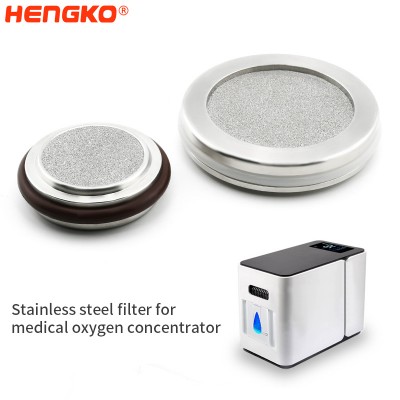
Sintered Porous Metal Stainless Steel Bacteria HEPA Filter for Medical Oxygen Concentrator
HENGKO Sintered porous metal Stainless steel bacteria HEPA filter for Medical Oxygen Concentrator adopts medical grade stainless steel material, have the ad...
View Detail -
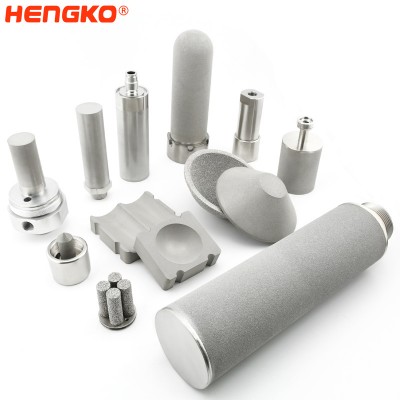
Porous Metal Powder Sintered Stainless Steel Catalyst Recovery Filters for Catalyst Rec...
A brief introduction to the working principle of catalyst filter (sintered filters) equipment: HENGKO Sintered Metal Catalyst Filter uses catalysts to recove...
View Detail -
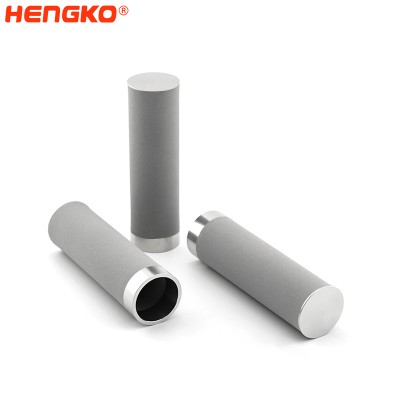
HENGKO Superior Membrane Surface Porous Sintered Metal Filter
Product Description:Upgrade your filtration efficiency and prolong the lifespan of your filters! HENGKO's sintered porous stainless steel filter product util...
View Detail -
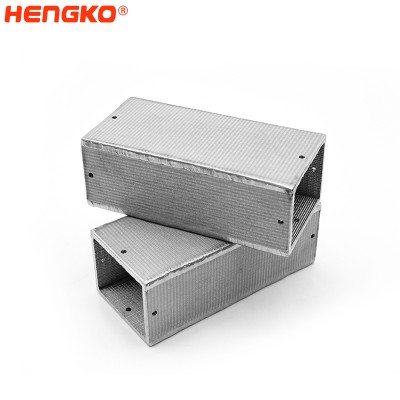
Porous Metal 316L Filter for catalytic reactions Granular Bed Filtration
Introducing the Porous Metal 316L Filter - Your One-Stop Solution for Chemical Detection! Are you tired of dealing with inefficient and complex chemical dete...
View Detail -
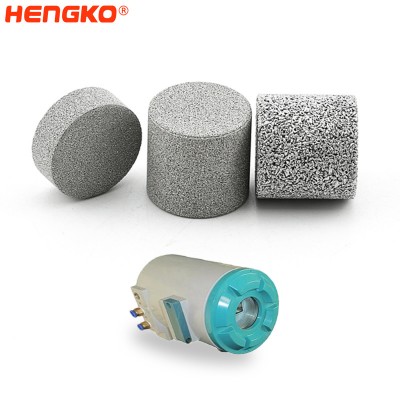
Monocrystalline silicon pressure transmitter sintered metal porous filter disc
Using single crystal silicon piezoresistive technology pressure sensor, process industry liquid level measurement applications sintered filter disc material:...
View Detail -
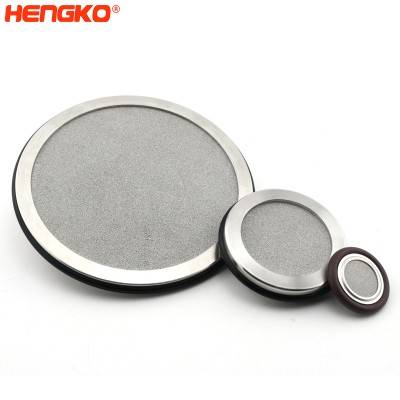
Porous sintered metal filter of ozone and air in water
The manufacturing process of large diameter (80-300 mm) discs of sintered stainless and corrosion-resistant steels is described. The characteristics of the i...
View Detail -

Sintered Porous Metal Leaf Disc Filter For the Polymer Melt Industry
Leaf Disc and Solid Plate Filters for critical hot melt polymer filtration applications. Leaf disc and solid plate filters are designed for critical h...
View Detail -
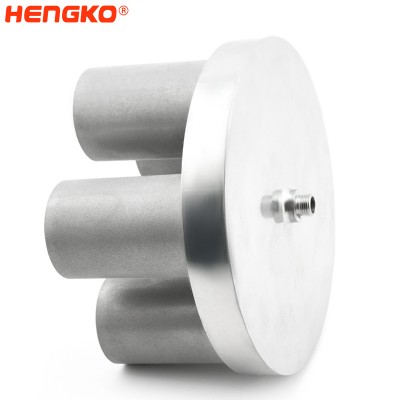
Porous Metal Filter Media and OEM Sintered Stainless Steel Filter for Hydrogen Gas
The porous metal filter media of the present invention includes a filtering unit which removes impurities from hydrogen gas, and a one-way control valve whi...
View Detail -
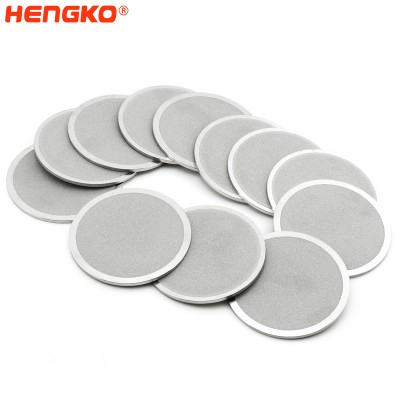
Sintered porous metal filter disc 20 micron for Gas purification and analysis
Achieve Unparalleled Gas/Solids Separation with HENGKO's Sintered Stainless Steel Filter Discs! Our filtration systems, featuring sintered stainless ...
View Detail -
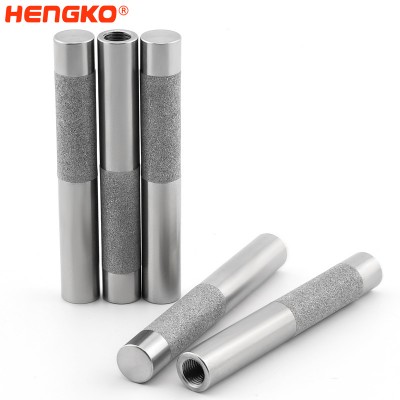
OEM Fiber Collimator Diameter 7mm Fiber Porous Metal Stainless Steel Filter
This product can be used for fiber collimation or for coupling focusing. The use of collimation, either single mode or multimode fiber can be used. If used a...
View Detail -
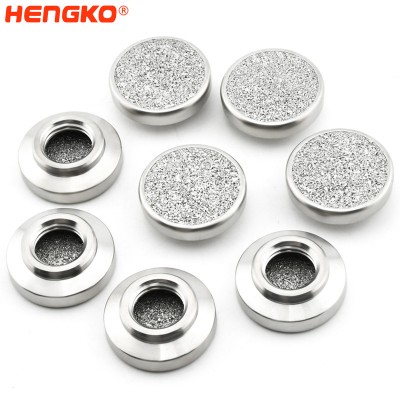
Stainless Steel Exhausts – Porous Metal Filter Muffler
Silencer / Filter made of porous metal Small silencers / filters made of porous metal with many applications. It reduces noise and is designed for selective ...
View Detail -
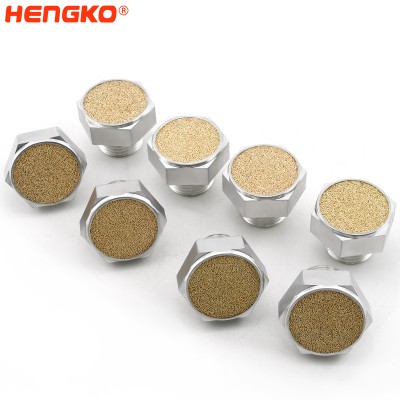
Porous Metal Muffler Filter Exhaust Pneumatic Solenoid Valve
ECONOMICAL CHOICE FOR MANY FILTERING AND MUFFLING SCENARIOS Filter-Mufflers have selective permeability with optimum filtering and diffusion for air ...
View Detail -
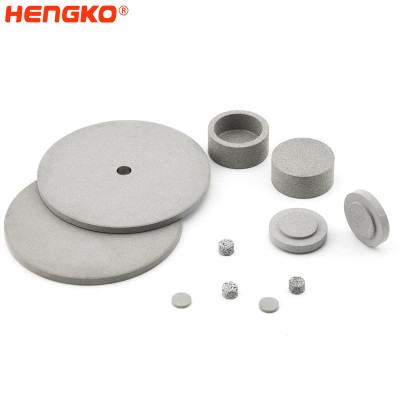
Stainless Steel Porous Metal Sheets SS316 Filter for Hydrogen Gas Diffusion
Stainless Steel Porous Metal Sheets SS316 Filter for Hydrogen Gas Diffusion Unlock the Versatility of Sintered Metal Elements with HENGKO! Our sintered meta...
View Detail -
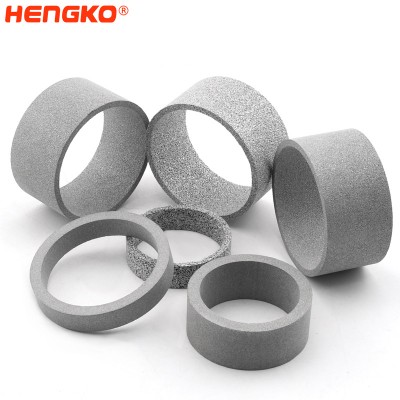
Stainless Steel Sintered Porous Metal Filter Tubes Porosity Down to 0.2 µm – In F...
Pore size:0.2-100microns Materials: SS Metal Porosity:30%~45% Working Pressure:3MPa Operating Temperature:600℃ Applications for sintered porous metal ...
View Detail -
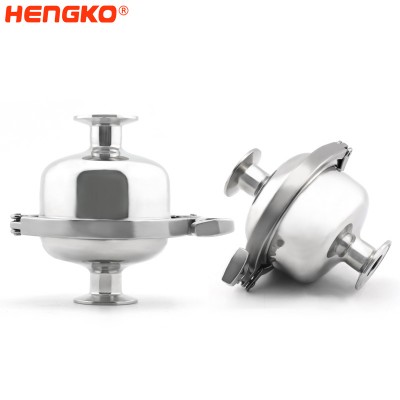
HENGKO porous metal disc test filter for Laboratory bench scale testing
Perfect for: - Laboratory bench scale testing -Feasibility studies -Smallscale, batch-type processes HENGKO's designs and produces bench-top filter, our po...
View Detail -
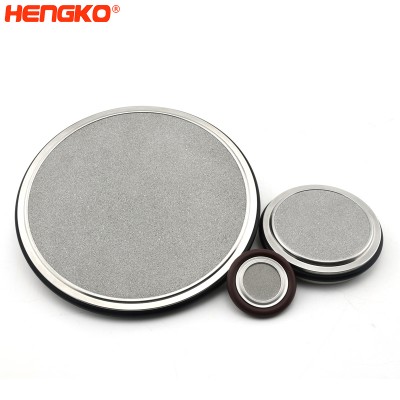
HENGKO Sterilizing Grade Media Bacteria Filtration 0.2 5um Filter Media Sintered Porous...
Introducing HENGKO's Sterilizing Grade Porous Metal Filter for Medical and Life Science Applications! HENGKO's newly developed porous metal filter is...
View Detail -
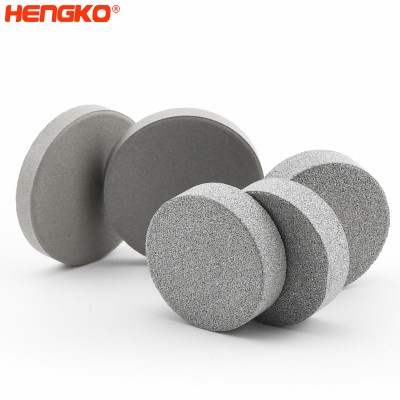
Porous Metal Filter Sintered Stainless Steel Disc Filter for Fiberf Yarn Production / P...
Porous Metal Filters HENGKO's porous metal filter design provides increased life and performance to polymer spin pack filtration. The filter is a sintered,...
View Detail
1. Introduction to Porous Metal Filters
(What They Are & Why They Are Critical)
Porous metal filters—also known as sintered metal filters, porous stainless steel filters,
or sintered porous elements—are engineered metal components containing a highly uniform
3-dimensional network of interconnected pores.
These pores are created by vacuum sintering metal powders at controlled temperatures, forming a rigid,
high-strength, permeable structure capable of precise filtration and flow control.
Because of their mechanical strength, corrosion resistance, stability, and reusability,
porous metal filters are widely used in:
- Semiconductor equipment (CVD / PVD / Etch / Diffusion / ALD)
- Gas analyzers and gas detection instruments
- Vacuum KF / VCR / ISO flange systems
- Fuel gas & hydrogen purification
- Environmental monitoring sensors
- Chemical and petrochemical systems
- Pharmaceutical and bioprocessing industries
- High-temperature gas/liquid filtration
- Sparging, aeration, and diffusion systems
- Flow equalization and flame arresting
A porous metal filter provides consistent and accurate filtration performance,
even under harsh environments involving high temperature, high pressure, corrosive chemicals,
cyclic loads, or aggressive gases.
2. Why Choose HENGKO as Your Porous Metal Filter OEM Factory?
HENGKO is a professional manufacturer specializing in sintered porous metal filters,
porous stainless-steel filter elements, sintered tubes/discs, and custom OEM
porous components used by global sensor brands and industrial system builders.
With more than 15+ years of porous metal R&D and OEM experience, we provide:
✔ Full-range OEM / ODM services
- Custom micron size (0.1–120 µm)
- Custom porosity (10–55%)
- Custom shapes: disc / cup / cone / tube / cartridge / blocks
- Custom materials: 316L / Bronze / Titanium / Nickel alloys
- CNC precision machining (NPT / BSP / UNF / VCR / KF / Flange)
- Laser welding and metal sealing
- Logo engraving & private labeling
- Prototyping + mass production
✔ Advanced vacuum sintering technology
- Ensures stable pore size distribution, high mechanical strength,
and consistent flow performance.
✔ Strong technical support
- Engineers with expertise in gas dynamics, filtration mechanics, metallic materials,
and sensor design.
✔ Complete QC system
Particle size analysis, porosity testing, helium leak detection, pressure resistance testing,
and chemical compatibility evaluation.
✔ High repeat-order rate from industrial manufacturers
- We supply porous metal filters to companies in:
semiconductor, instrumentation, environmental monitoring, chemical engineering,
gas equipment, petrochemical, and laboratory industries.
HENGKO is not a trading company
—we are a direct OEM factory, ensuring stable-quality
production and competitive pricing.
3. How Porous Metal Filters Work
(Engineering-Level Explanation)
Porous metal filters operate through a complex but highly
controllable mechanism combining:
3.1 Mechanical Filtration (Primary Mechanism)
Particles larger than the pore size are mechanically intercepted and
retained on or within the 3-D porous structure.
3.2 Depth Filtration
Unlike mesh screens, porous metal filters have thick porous pathways,
allowing particles to become trapped within the depth of the material.
3.3 Diffusion & Inertial Interception
At smaller micron levels (0.1–5 µm), particle capture relies on
Brownian motion and inertial collision.
3.4 Laminar Flow Equalization
Porous metals generate extremely uniform laminar flow, ideal for:
- Gas analyzers
- Pressure equalization
- Emission detection
- Flow control devices
3.5 Sparging & Aeration
When used for sparging/diffusion, pressurized gas passes through micro-pores,
creating fine and uniform microbubbles.
4. Material Options for Porous Metal Filters
(Full Technical Comparison)
HENGKO offers multiple metal materials depending on application, chemical environment,
cost, and performance requirements.
Here is a detailed comparison table to help you easily review and compare different porous metal filter materials:
| Material | Key Advantages | Best Applications |
|
316L Stainless Steel (Most Popular) |
• High mechanical strength | • Gas detection systems |
| • Excellent corrosion resistance | • Vacuum KF / VCR interfaces | |
| • Withstands 200–500°C | • Chemical filtration | |
| • Suitable for most gases & liquids | • Sensor protection | |
| • Cost-effective & stable | • Hydrogen / nitrogen / compressed air systems | |
| • Ideal for general industrial filtration | ||
| Bronze Porous Metal Filters | • Lower cost | • Pneumatic systems |
| • Moderate mechanical strength | • Silencers | |
| • Good filtration uniformity | • Air exhaust filtration | |
| • Suitable for general air filtration | ||
|
Titanium Porous Filters (Ultra High Performance) |
• Extreme corrosion resistance | • Semiconductor gas filtration |
| • Biocompatibility | • Biomedical industry | |
| • High temperature resistance up to 600°C | • High-purity chemical processes | |
| • Ultra-clean, ideal for critical processes | ||
|
Nickel Alloy / Monel / Inconel Porous Filters |
• Exceptional corrosion resistance | • Harsh chemical processes |
| • Withstands highly oxidative or acidic gases | • High-temperature reactors | |
| • High mechanical strength under cyclic load | • Corrosive gas filtration |
5. Manufacturing Technology:
How HENGKO Produces High-Performance Porous Metal Filters
Our production combines advanced powder metallurgy, controlled sintering, precision machining, and high-level quality control.
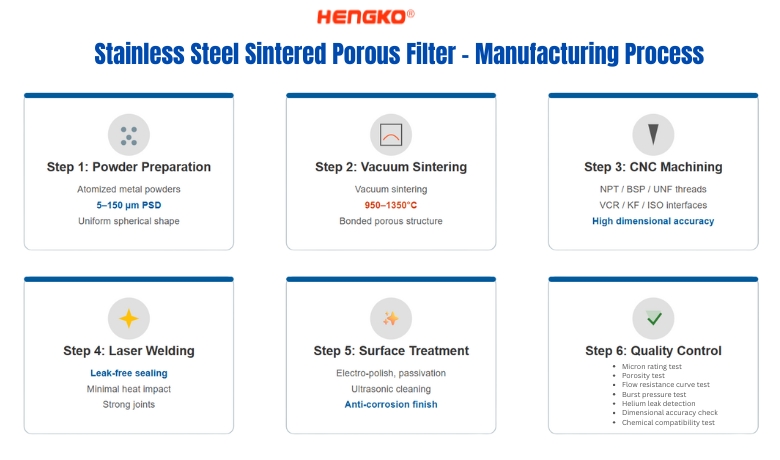
6. Technical Specifications of Porous Metal Filters
Porous metal filters must meet strict engineering parameters to ensure stable performance in high-pressure, high-temperature,
or corrosive environments. Below is a detailed technical specification list applicable to HENGKO’s sintered porous components.
so you can know details of each materials of porous metal can use.
6.1 General Technical Specifications
| Specification | Value / Range | Notes |
|---|---|---|
| Micron Rating | 0.1–100 µm | Narrow PSD, stable pore structure |
| Porosity | 10–55% | Adjustable based on flow/pressure requirements |
| Thickness | 0.2–10 mm | Custom available |
| Max Pressure Resistance | Up to 30 MPa | Depends on shape & thickness |
| Temperature Range | -200°C to 600°C | Per material (316L, Ti, Ni alloy) |
| Flow Rate | Custom tested based on API/ISO curves | Flow data available |
| Chemical Resistance | Excellent | Ideal for gas/liquid corrosive media |
| Cleaning Method | Ultrasonic, back-flush, chemical wash | Reusable |
| Materials | 316L / Bronze / Titanium / Nickel Alloy | OEM material selection |
| Shape Options | Tube, disc, cup, cone, cartridge, block | Fully customizable |
| Welding | Laser welding / TIG welding | Leak-proof |
| Machining | CNC precision up to ±0.02 mm | For threads & flanges |
6.2 Mechanical Strength Specifications
| Property | Typical Value |
|---|---|
| Compression Strength | >150–300 MPa (316L) |
| Tensile Strength | 500–600 MPa (varies by material) |
| Burst Pressure | 5–30 MPa (depends on OD/ID/thickness) |
| Poisson Ratio | 0.25–0.30 |
| Young’s Modulus | 120–160 GPa |
6.3 Filtration Performance Specifications
| Parameter | Description |
|---|---|
| Pore Size Distribution (PSD) | Narrow distribution ensures predictable filtration |
| Depth Filtration | Multi-layer internal particle capture |
| Flow Uniformity | Highly stable laminar flow |
| Gas Permeability | High permeability even in 1–2 µm grades |
| Liquid Filtration Efficiency | 95–99.9% depending on micron size |
6.4 Chemical Compatibility Chart (Short Version)
| Medium | 316L | Titanium | Nickel Alloy | Bronze |
|---|---|---|---|---|
| Acids | Good | Excellent | Excellent | Poor |
| Alkalis | Good | Excellent | Excellent | Medium |
| Organic Solvents | Excellent | Excellent | Excellent | Good |
| High Purity Water | Good | Excellent | Good | Poor |
| Oxidizing Gases | Medium | Excellent | Excellent | Poor |
| Corrosive Gases | Medium | Excellent | Excellent | Poor |
7. Product Selection Guide
(Micron • Material • Shape • Application)
Here we will list some advices based on your different pore size, condition, shape and
applications, you can check detail as following :
7.1 How to Choose Micron Rating
| Micron Size | Recommended Use |
|---|---|
| 0.1–0.5 µm | Ultra-fine gas filtration (semiconductor, lab analyzers) |
| 1–5 µm | Gas analyzers, flame arrestors, pressure equalizers |
| 10–20 µm | Sensor protection, gas sampling systems |
| 20–40 µm | General gas & liquid purification |
| 60–100 µm | Sparging, aeration, diffusion |
7.2 How to Choose Material
| Requirement | Recommended Material |
|---|---|
| High corrosion resistance | Titanium / Nickel Alloy |
| High temperature (400–600°C) | Titanium / Nickel Alloy |
| Cost-sensitive projects | 316L / Bronze |
| High purity applications | Titanium |
| Strong pressure & mechanical load | 316L / Nickel Alloy |
| Semiconductor gases | Titanium |
7.3 How to Choose Shape
| Shape | Use Case |
|---|---|
| Disc | Gas sampling, inline filtration |
| Tube / Cylindrical | Sparging, diffusion, pressure equalization |
| Cup / Cone | Sensor protection, flame arrestors |
| Cartridge | High flow industrial systems |
| Block / Plate | Chemical reactors, high-temperature filtration |
7.4 How to Choose Based on Industry
| Industry | Recommended Filter Type |
|---|---|
| Semiconductor | Titanium porous tube/disc, 0.1–5 µm |
| Gas analyzers | 316L tube/disc, 1–20 µm |
| Vacuum systems | 316L KF/VCR filters |
| Chemical plants | Ni-alloy cartridges |
| Environmental monitoring | 316L sensor housings |
| Sparging systems | 20–100 µm porous tubes |
8. Flow Rate & Pressure Drop Curves
Here are generalized flow characteristics based on typical HENGKO porous metal filter structures (actual curve depends on OD/ID/thickness/micron grade):
8.1 Gas Flow Curve (Example: 316L, 10 µm)
- Flow increases linearly at low pressure differentials
- Enters laminar regime at 0.05–0.2 MPa
- Stable plateau ensures no pulsation
- Suitable for gas detection, sampling systems
8.2 Liquid Flow Curve (Example: 316L, 20 µm)
- Higher pressure required due to viscosity
- High stability under temperature fluctuation
- Excellent for alcohols, hydrocarbons, solvents
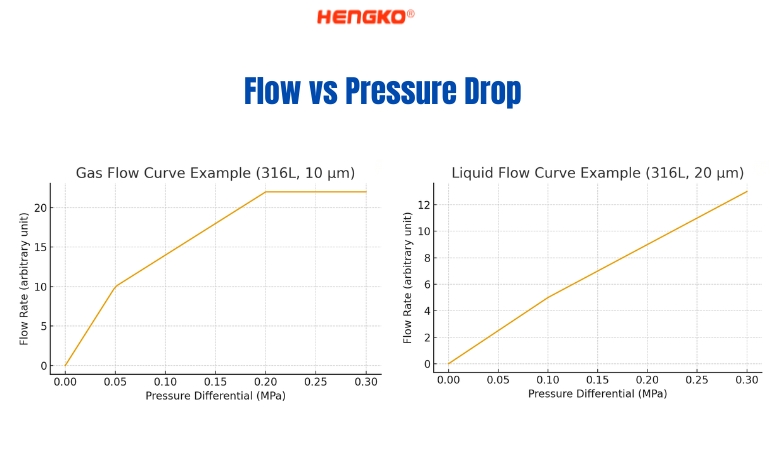
9. Product Models
(Disc • Tube • Cone • Cartridge • Sensor Housing)
9.1 Porous Metal Disc Filters
Used in gas analyzers, vacuum systems, sampling, and sensor protection.
| Parameter | Range |
|---|---|
| OD | 5–120 mm |
| Thickness | 0.3–5 mm |
| Micron Rating | 0.1–100 µm |
| Material | 316L / Ti / Bronze / Ni alloy |
9.2 Porous Metal Tubes (Cylindrical Filters)
Ideal for sparging, aeration, flow equalization, and high-pressure filtration.
| Parameter | Range |
|---|---|
| OD | 3–80 mm |
| Length | 10–1200 mm |
| Wall Thickness | 0.5–3 mm |
| Micron Rating | 0.2–60 µm |
9.3 Porous Metal Cone / Cup Filters
Used in flame arrestors, sensor housings, gas detectors.
| Parameter | Range |
|---|---|
| OD | 3–50 mm |
| Height | 5–60 mm |
| Micron | 1–50 µm |
9.4 Porous Metal Cartridges
Used in chemical plants, reactors, compressed gas filtration.
| Parameter | Range |
|---|---|
| OD | 20–80 mm |
| Length | 50–1000 mm |
| End Caps | NPT / BSP / Flange / Custom |
| Micron | 1–40 µm |
9.5 Porous Metal Sensor Housing Filters
Used in temperature, humidity, dew point, and gas sensors.
| Parameter | Range |
|---|---|
| Thread | M10 / M12 / 1/4 NPT / Custom |
| Micron | 1–20 µm |
| Material | 316L / Nickel Alloy |
| Housing Type | Cup / Tube / Customized |
10. Application Industries
Porous metal filters are used across 50+ industrial sectors.
10.1 Semiconductor Manufacturing
- CVD
- PVD
- Etching
- ALD
- Diffusion furnaces
- High-purity gas lines
Titanium porous metal filters are preferred due to purity & corrosion resistance.
10.2 Gas Analysis & Detection
Used in:
- CO₂ analyzer
- O₂ / H₂ / CH₄ sensors
- FTIR instruments
- Portable gas detectors
Provides stable flow and prevents particle contamination.
10.3 Chemical Processing Plants
Used for:
- High-temperature reactors
- Solvent filtration
- Catalyst protection
- Corrosive gas filtration
Nickel alloy is ideal here.
10.4 Vacuum & VCR / KF Systems
- KF16 / KF25 / KF40 porous protection filters
- VCR gasket filters
- Vacuum chambers
316L stainless steel is preferred.
10.5 Environmental Monitoring
- Air quality sensors
- Meteorological stations
- Water testing systems
Porous metal prevents dust, insects, and droplets from entering sensors.
10.6 Sparging & Aeration Systems
For mixing gases into liquids (bioreactors, chemical reactors, labs).
- Fine bubble diffusion
- Highly uniform distribution
- No clogging
Porous metal tubes (20–100 µm) work best.
11. Why Customers Switch to HENGKO
Porous metal filters are used across semiconductor, petrochemical, environmental, gas analysis,
and industrial automation systems.
Many global companies use proprietary porous metal elements, but HENGKO provides
full compatibility and cross-reference replacements with equal or superior performance.
| Feature | MOTT / Ames / Others | HENGKO |
|---|---|---|
| OEM Customization | Limited | Unlimited (full OEM/ODM) |
| Delivery Time | Slow | Fast, flexible |
| MOQ | Medium–High | Low MOQ available |
| Cost | Higher | More cost-effective |
| Engineering Support | Strong | Strong + Faster + Flexible |
| Sensor Housing OEM | Rare | Specialized |
11.1 OEM / ODM Custom Service
OEM/ODM is the core of HENGKO’s porous metal business.
We support full customization, including:
Customization Parameters
| Custom Parameter | Description |
|---|---|
| Micron Rating | 0.1–100 µm (precise PSD control) |
| Material | 316L / Bronze / Titanium / Monel / Inconel |
| Dimensions | OD/ID/Length/Thickness totally customizable |
| Shapes | Disc, tube, cone, cup, cartridge, block |
| Thread Interface | NPT, BSP, UNF, M10/M12, or custom |
| Surface Finish | Electropolish, passivation, polishing |
| Welding | Laser welding, TIG welding |
| Pore Structure | Controlled porosity (10–55%) |
| Flow Performance | Designed according to pressure drop targets |
| Logo / Labeling | OEM print, laser marking |
| Packaging | Industrial PE, dust-proof, cleanroom options |
11.2 OEM Process Flow
1.Requirement Collection
Micron rating / material / drawings / environment / flow target
2.Design & Simulation
Flow rate, porosity distribution, mechanical load analysis
3.Prototype Fabrication
Small-batch samples (1–20 pcs)
4.Testing & Validation
Pressure, chemical, and dimensional accuracy tests
5.Mass Production
Vacuum sintering + CNC + welding + QC
6.Packaging & Shipment
Industrial export packaging
FAQ – Common Engineering Questions
1. What is the standard micron rating range of porous metal filter ?
HENGKO porous metal filters are available from 0.1 µm to 100 µm, with narrow PSD for stable, repeatable filtration performance.
2. Can porous metal filters be cleaned and reused?
Yes. They can be cleaned by:
*Back-flushing
*Ultrasonic cleaning
*Chemical cleaning (acid/alkali depending on material)
*High-temperature baking
This makes them highly cost-effective compared to disposable filters.
3. What is the maximum temperature resistance?
| Material | Max Temperature |
|---|---|
| 316L | 400–500°C |
| Titanium | Up to 600°C |
| Nickel Alloy | Up to 600°C |
| Bronze | ~250°C |
4.What pressure can porous metal filters withstand?
Depending on OD/ID and thickness, they can withstand up to:
*10–30 MPa (316L tubes)
*5–20 MPa (discs and cones)
Special high-pressure models available on request.
5.Are porous metal filters suitable for corrosive gases or liquids?
Yes.
316L is suitable for general industrial chemicals.
Titanium and Nickel alloys are recommended for:
*Acidic gases
*Oxidative gases
*Corrosive liquids
*High-purity chemicals
6.Can you manufacture based on drawings or samples?
Absolutely.
We accept:
*2D/3D CAD files
*STEP/IGES
*Physical samples
*Reverse engineering requirements
7.What is the typical lead time?
*Samples: 7–12 days
*Mass production: 15–25 days
*Large OEM orders: negotiated based on volume
8.Do you provide OEM branding and labels?
Yes, we support:
*Laser-etched logos
*Private label packaging
*OEM barcode printing
9.What industries use porous metal filters?
*Semiconductor
*Gas analysis
*Chemical plants
*Environmental monitoring
*Fuel & hydrogen systems
*Vacuum systems
*Laboratory & biotech
10.How can I get a technical quote?
You can email your project details directly to: ka@hengko.com
Ready to Start Your Porous Metal Filter Project?
We provide full OEM/ODM engineering support, from micron rating design to complete sintered metal assembly.
Whether you need 316L, Titanium, or Nickel alloy porous filters, our technical team can help you build the right solution.
Email us your requirements: ka@hengko.com
- WhatsApp/WeChat support available upon request
- Drawings • Specs • Samples • Customized Designs
HENGKO – Your Trusted Porous Metal Filter OEM Factory
